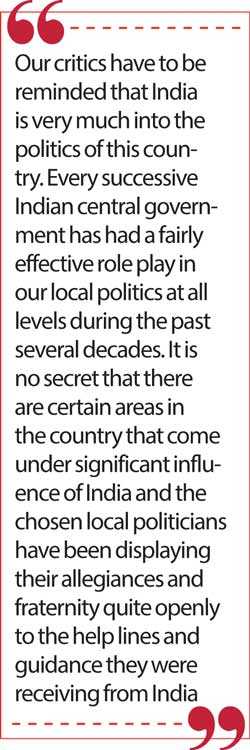Wednesday Feb 25, 2026
Wednesday Feb 25, 2026
Tuesday, 23 February 2021 00:00 - - {{hitsCtrl.values.hits}}

Tripura Chief Minister Biplab Deb
 The frantic fuss made to let off steam by a fairly representative segment of the Sri Lankan society over the issue of a statement supposed to have been made by a BJP political leader recently in India has caused much alarm and concern.
The frantic fuss made to let off steam by a fairly representative segment of the Sri Lankan society over the issue of a statement supposed to have been made by a BJP political leader recently in India has caused much alarm and concern.
Members of the clergy, social groups, governing party politicians including the Cabinet Ministers as well as the opposition, are making statements and casting aspersions on this matter. The media stations too are doing the same by trying to make mountains out of molehills as usual. Combined effect of all these is contributing in a big way to exhibit the audacity of our heedlessness to the rest of the world.
The impugned statement is about the interest the ‘BJP has to get involved in the political activities of Sri Lanka as a party’. In the first place is it some responsible statement made by someone in authority or some passing remark by somebody in a context irrelevant to us? The basic knowhow related to the subject shows that a foreign registered political party cannot play politics direct in its name here unless they get a party branch registered with the COE of Sri Lanka. There are many requirements to be fulfilled before a party is accepted for registration here. Hence this alarm and brouhaha is totally unwarranted and such idiosyncrasies tend to make us look like fools in the eyes of the international community.
Reportedly the news took to wings based on a statement supposed to have been made by the State Minister Amit Sha during the recent visit of PM Modi to Tamil Nadu. But according to the available information this so-called controversial statement appears to be a hear-say version made by a third party totally lacking any direct authenticity. Before we make any analytical references regarding this matter let us take a look at the origin of this legend. First of all, let us see where this statement was made and by whom?
Tripur is a state in northeastern India. The third-smallest state in the country, it covers 10,491 km2 (4,051 sq. m.) and is bordered by Bangladesh with a population of about 3.6 million. The Chief Minister of Tripur is Biplab Deb. It is the Tripura chief minister who has claimed that Amit Shah had shared his intentions of expanding BJP to neighbouring countries during a party meeting in Tripura on Saturday (13 February). This came as a news item published by East Mojo, on 14 February as follows, reported in New Delhi.
“New Delhi: Tripura Chief Minister Biplab Deb has revealed that Amit Shah has plans to establish BJP governments in Nepal and Sri Lanka, according to a report published by East Mojo.”
Now this is the big story that our politicians, social media fellows, some clergy and a whole lot of others have picked up and making their own implications in response creating such a big fuss.
The crux of the matter is that a Chief Minister of a small state government in India says that a minister of the central Government shared with him an interest he had to establish BJP governments in Sri Lanka and Nepal!
Fanciful and an abstract imagination
What a fanciful and an abstract imagination. It is noteworthy that there is a strong opposition built up against the statement made by the Tripura chief minister. There was a demand by political leaders there seeking clarifications from the Central leadership of the BJP regarding this statement.
Former MP Jitendra Chaudhary denounced the Chief Minister’s statement by stating, “He does not have any understanding of the constitution and democracy,” adding further that Amit Sha’s statements as claimed by Deb, amounted to the interference of India in the internal affairs of a foreign country. Jitendra who is also the leader of CPI(M) used the revelations by the Tripura chief minister as evidence to level allegations that the home minister of India was engaged in a conspiracy against Nepal. He went further to declare that Deb’s statement cannot be taken casually and demanded a response from the BJP and Prime Minister Narendra Modi.
The Congress vice president of Tripura, Tapas Dey, said that the statement supposed to have been made by Amit Sha amounted to imperialism adding that India has no right to interfere in the sovereign affairs of Nepal and Sri Lanka.
These reactions by Indian politicians indicate that it is an unfounded statement by the Chief Minister of this state government and the central government, or, the BJP are not ready to accept any responsibility. It also indicates that the Indian sentiments are not altogether universally pervasive as made out to be. There is a wide spectrum of people in India who love democracy and oppose imperialism that suppressed India for many years and which they themselves battled to eliminate at a cost of many human lives and painful sacrifices.
If we look at the issue more objectively it becomes clear that BJP is having a more important issue in hand and trying hard to establish their power base in Tamil Nadu. During the first 20 years after Independence, it was the Indian National Congress that dominated Tamil Nadu politics. In 1967 the Dravidian politics took over the government of Tamil Nadu wresting it from the Congress, dividing the power between DMK and AIADMK being elected alternatively by the People. The leading figures in the film industry became the Peoples’ Leaders and popular film stars like M.G. Ramachandran, M. Karunanidhi and J. Jayalalitha became chief ministers there.
Birth of Dravidian Politics came in the wake of Anti-Hindi agitations that became active in the 1960s. There have been burning issues regarding the usage of Tamil instead of Hindi and the central government of India had to yield to the political pressure built by Tamil leaders to make Tamil the first language choice in Tamil Nadu. The State underwent a separation of the Telugu Speaking areas dividing as Andhra Pradesh in 1953.
Tamil Nadu has become a hot spot for BJP politics. Prime Minister Modi and his party are trying their best to secure a victory in the state. The Government of India has launched several massive development schemes in the region. BJP as a party has to win over the Tamil speaking people and get their support to secure that victory. Therefore, they have to address the issues of interest of these voters. It is a well-known thing that the Tamil speaking population there have a sympathetic and brotherhood relationship with the Sr Lankan Tamils. There have been many instances where agitations were staged in Chennai in support of the Tamils in Sri Lanka espousing their cause. In particular during the heydays of Prabhakaran in Sri Lanka, there was a fairly significant support group in Tamil Nadu to his activities. This however got diluted after the assassination of Rajiv Gandhi by the LTTE.
Tamil Nadu state politics has been a bone of contention for all successive central governments in India. Appeasing the Dravidian population has been a priority for all political forces in India.
It is a common thing for the politicians anywhere to raise and refer to issues common to the people of the area and it is not difficult to understand that similar interests would have been displayed by Indian politicians when they come down to the Tamil Nadu area for political propaganda. It is quite possible that someone less important would have referred to the hear-say talk of the Tripur chief minister about a BJP interest in political activities of Sri Lanka while campaigning in Chennai.
Sometimes helpful and sometimes harmful
India from time immemorial has been involved in Sri Lankan affairs, sometimes helpful and sometimes harmful. The two countries have been involved in wars in the long past. The historical records indicate an event, “Sri Lanka’s King, Gajabahu is remembered is his invasion of Chola territory and liberation of the 12,000 Sinhalese prisoners seized in his father’s reign”. Things however, have drastically changed after both countries gained Independence status from Imperialism after long years of battle with human sacrifice.
There are several noteworthy events in the recent history relating to the political relations between India and Sri Lanka.
These were some of the landmark accords between the two countries in achieving peaceful resolutions for the mutual benefit of the two countries.
In the economic front India has been a ready source with willing assistance in our difficult times. The two countries have had many exchange SWAP transactions which provided significant timely relief during pressing times. Promising humanitarian assistance has been extended to us as a country to tide over natural calamities and disasters faced by our country on many occasions as the immediate help source.
In the international scenario India has always been our fraternal support to counter any undue influences we were subject to. The unity between the two countries and the mutual concerns shared among the two became a source of strength to us. Our strengths and weaknesses in the contemporary geo-politics have been shared with mutual trust and confidence so far within the ambit of the sovereign
rights of each.
There have been a few instances of friction on certain issues which have been subdued with mutual understanding. Actions initiated by India as warning signals before further intervention during the Vadamarachchi battle (the infamous airdrop of relief supplies), Indo-Sri Lanka Accord on 29 July 1987, the episode of a SL Naval rating attacking Rajeev Gandhi during the farewell guard of honour on 30 July 1987, were some of the thorny issues that has gone into the records as events causing much embarrassment, friction and displeasure. But our mutual relationship values have survived amidst such minor differences.
Our critics have to be reminded that India is very much into the politics of this country. Every successive Indian central government has had a fairly effective role play in our local politics at all levels during the past several decades. It is no secret that there are certain areas in the country that come under significant influence of India and the chosen local politicians have been displaying their allegiances and fraternity quite openly to the help lines and guidance they were receiving from India.
All know how the game play has been strategised with large funding arrangements to the centre while peripheries came under the direct control through hand-picked agents who eventually become kingpins in the power equation of the country on crucial issues. Therefore, in the light of this reality, those who continue to bark at the moon, or, barking mad up the wrong tree, should try to ingress a little bit of sanity into their systems.
Most recent misunderstandings centred round the East Container Terminal of the Colombo Port becoming a burning issue refreshed the growing displeasures the two countries were developing due to the Chinese role in Sri Lankan economy. It is not difficult to understand how the gravity of the disputed statement could manifest to this magnitude in such a background. Nevertheless, both countries will have to look forward to re-establish closer consultations on matters of mutual interest and pave the way for a healthy partnership to continue.